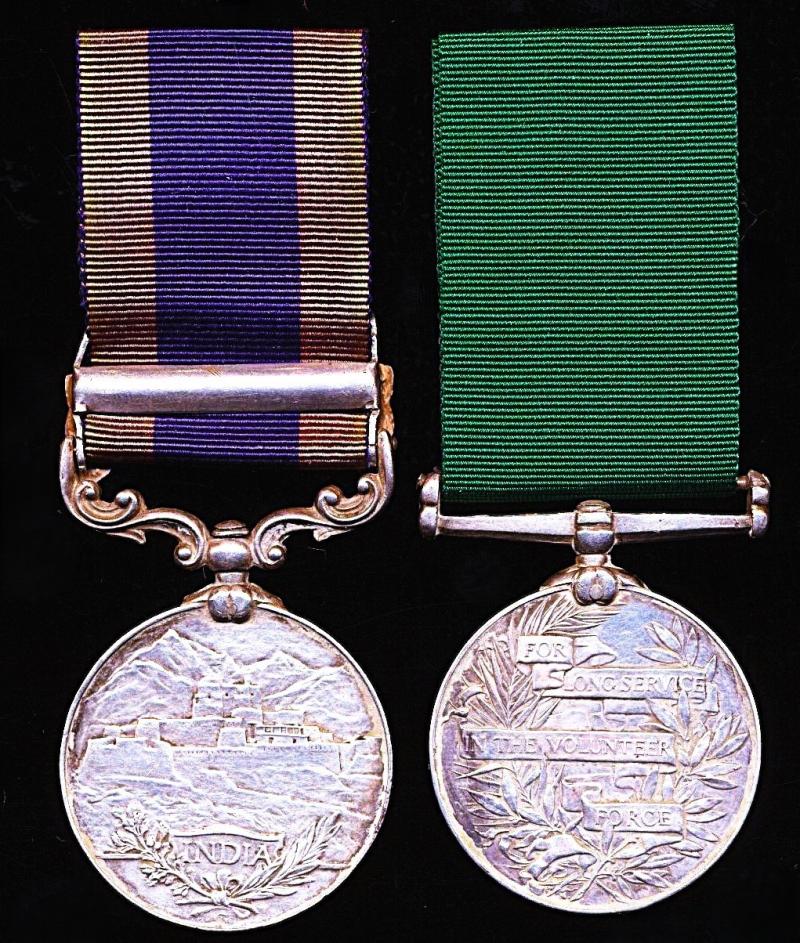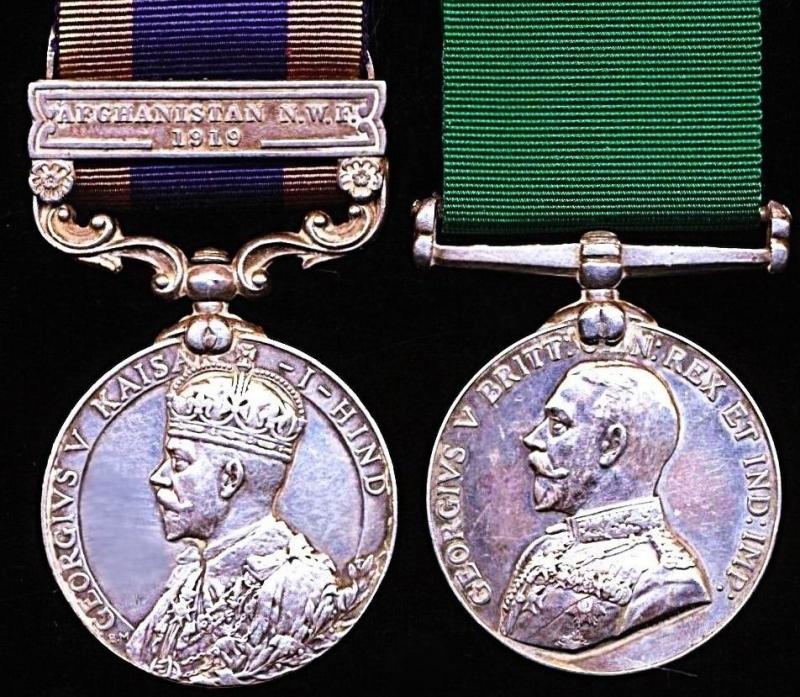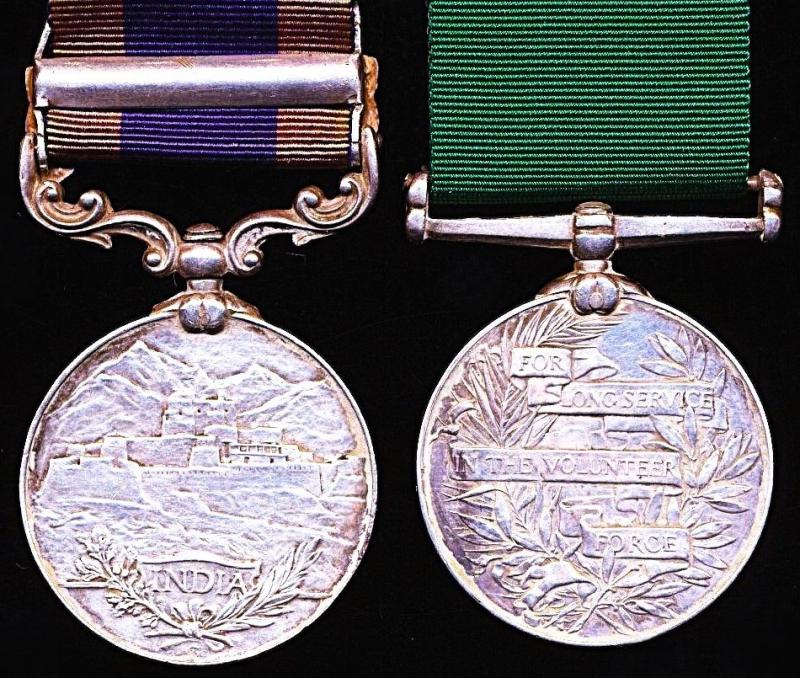A rare 'Parsi' Station Master's campaign and long service medal pair: Station Master Kaikhushroo Nusserwanji Cantweenwalla, North Western Railways, late 2nd Battalion North Western Railway Regiment, Auxiliary Force India
- IGS 1908-35. GV 1st issue with clasp 'Afghanistan N.W.F.1919' (S-Mstr. K. N. Canteenwala, Rlys.)
- Volunteer LSM (India & Colonies). GV issue (Cpl. K.N. Canteenwalla, 2-N. W. Ry. R. A.F.I)
Medals Verification: Post 1918 Campaign Medal rolls for awards of the IGS 1908-35 to Indian Civilians / Volunteers are not accessible in the public domain. The award of the Volunteer Long Service Medal is confirmed per below cited Army Order
- Volunteer Long Service Medal: Published in Indian Army Order No. 819 of date 1925, son of
The recipient Kaikhushroo Nusserwanji Canteenwalla (1885-1950) was a native of Karachi, Sindh Province (now located in Pakistan) and a member of the Zoroastrian (Parsi) faith & community. For many years was an employee of the North Western Railway (with Headquarters in Lahore, Punjab). Reference Thacker's Indian Directory edition for 1915, he is listed therein employed at Karachi, as a member of staff of the District Traffic Superintendent's Office, where he is recorded holding an appointment as 'Assistant Station Manager' at Karachi Cantonment (there were two such appointees holding this title in Karachi in 1915)
The role of the North Western Railway as a line of communication service during the Third Afghan War and North West Frontier disturbances of 1919, was not markedly different from what that railway company's role had been, during the prior Mashud North West Frontier Campaign of 1917, reference the article published in the Englishman's Overland Mail issue of, 19 January 1919, below quoted:
Quote,
THE WAZIRISTAN EXPEDITION
WHAT THE RAILWAYS DID
An expedition against the Mahsud's on the North West Frontier took place in the hot weather of 1917 and deserves mention in this report owing to the special difficulties experienced by the North Western Railway in its function as a line of communications says the Railway Report for 1917-1918.
The broad gauge line terminates at Mari Indus. On the east bank of the Indus, the river is crossed by a steam ferry and a narrow gauge line connects Kalabagh Ghat on the west bank with the rail- heads at Bannu and Tank. Troops, transport and supplies, etc., consequently not only had to undergo transhipment from broad gauge to narrow gauge, but had in the course of this transhipment to be ferried across the Indus, at a site where it is liable to severe floods, in the summer time. Moreover the narrow gauge line west of the river is peculiarly susceptible to flood damages, and during operation the line was actually breached no less than 47 times.
The operations started in March, but it was not till May, that the Waziristan Field Force was fully constituted. The Force was a large one for a line of communication of the nature described, and in addition to fighting troops, included miscellaneous units, such as British and Indian Stationary Hospitals, Field Ambulances, Army Bearer Corps, Supply Columns, etc. The rolling-stock of the 2 ft. 6 inch. line was not sufficient to meet this large call and it was necessary to supplement it by obtaining 60 good vehicles, and 6 Locomotives from the Bengal-Nagpur Railway 2 ft. 6 inch. lines in the Central Provinces; additional coaching stock had also to be requisitioned from the same source, and 14 of these carriages were expeditiously converted by the North Western Railway into an Ambulance Train, which owing to the severe climatic conditions had to run as a regular service for the evacuation of the sick. A second ferry steamer belonging to the Punjab Government was brought up to Ghazi Ghat, and put into commission at the Mari-Kalabagh Ferry, to assist in transhipment across the river.
A total of 17,000 tons of supplies, etc., was carried to Tank and Bannu during the operations, and the necessity for providing additional railway facilities at rail-head threw an extra strain on the line of communications; materials for these works were, however, carried without interfering with the programme of movements for troops and supplies. The dispersal of the Force commenced on the 16th August, and was completed on the 21st September. It has given great satisfaction to the Board that the Military Authorities expressed their appreciation of the manner in which transport of troops and supplies was carried out by the railway, especially on the Trans Indus portion of the line, where it was acknowledged to be due to the unceasing efforts of the railway personnel that the heavy military traffic was dealt with in spite of the frequent operations due to flood damages.
Unquote
In addition to their primary role as a line of communications logistics provider, British engineers, their staff and labour crews of the North Western Railway were also frequently contracted for the building of road bridges in the North West Frontier and North West Frontier Province of British India
North Western Railway: The North-Western State Railway (NWR) was formed in January 1886 from the merger of the Sind, Punjab and Delhi Railway, the Indus Valley State Railway, the Punjab Northern State Railway, the eastern section of the Sind-Sagar Railway and the southern section of the Sind-Pishin State Railway Later renamed the North Western Railway, by 1905 it was the longest railway in British India, that was under one administration and was the strategic railway of the North-West Frontier, province. In 1947, one part became the nucleus of Pakistan's railways, with 4976 of the old system's 6861 miles lying within the new state; the part lying in India was reorganised and renamed as Eastern Punjab Railway
An extremely scarce medal pair by appointment and ethnicity, named to a Station-Master of the Parsi (Zoroastrian) faith
Condition: VF
Code: 24780






